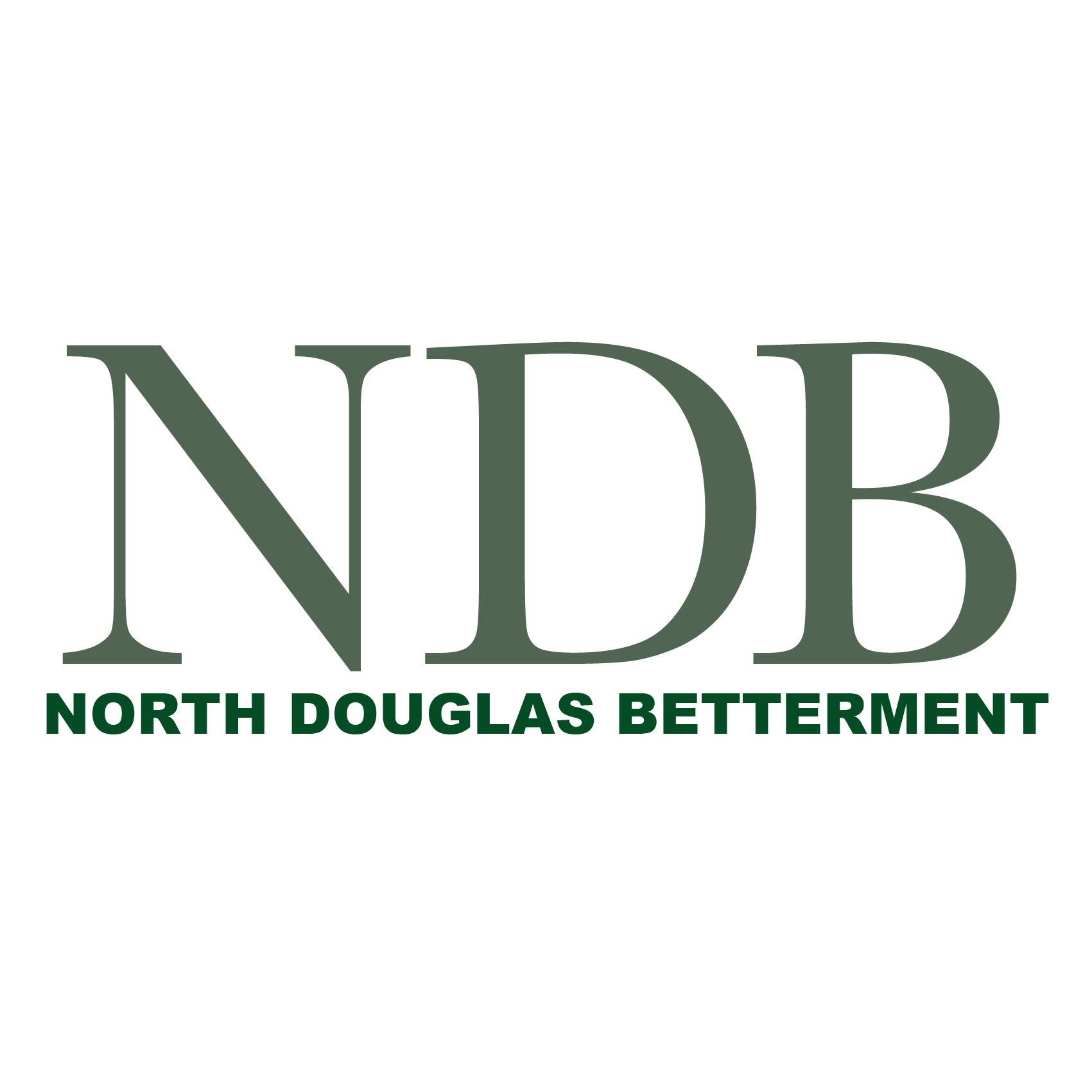Yoncalla Log Pond
Status Update
November 2023
Background History: The log pond property was donated to North Douglas Betterment (NDB) in 2012, by Eagle’s View Management (Donald Woolley). The informal agreement was that NDB would manage the property for the best interests of the community. NDB then initiated a planning process to determine the best use of the property. During this time NDB sought grant funding and conducted several surveys to determine the values and issues associated with the property. This work included clearing the extensive blackberry growth to enable access the entire property. The public was encouraged to visit the pond and comment on possible uses. In 2015 seven management options were developed: (1) No Action, (2) Primitive Wildland Recreation, (3) Ecological / Cultural Education Resource area, (4) Improve Bass Fishery, (5) Conventional Park / Picnic area, (6) Wetland Banking, (7) Wastewater Finishing. In 2016, the NDB board chose to develop a wetland mitigation bank on the south portion of the pond.
In September 2016, NDB contracted with Cascade Environmental Group from Portland to guide the mitigation bank process that involved: (1) completing two additional environmental assessments required by DEQ, (2) completing design drawings for the proposed bank; (3) submitting the permit applications and (4) helping to supervise the construction. Financing for the project, and the bonding required, was done through a contract with the Department of State Lands (DSL). As part of the contract agreement, NDB agreed to sell the first eight wetland credits generated by the bank to DSL.
In the spring of 2021, final agency approval for the project was obtained and NDB began draining the pond to enable construction of a cross dike to isolate the southern portion of the pond. By the end of the summer, water levels were down six feet, and a rock causeway was built across the pond that would become the base of the new cross dike.
In the spring of 2022, the outlet culvert was lowered, and water was pumped out of the south side of the pond to dry it out enough to support the heavy equipment that would be needed to level the site. By August, large excavators, cats, and off-road dump trucks began removing the dike on the southeast side of the pond and using the dirt to build the new cross levy. When the rains began in late October, the site was almost down to grade, but some areas were too wet to continue, and the project was delayed until the summer of 2023. The final grading of the site was completed in late summer of 2023.
Remaining work includes a final “as-built’ survey and final agency approval. NDB will then be able to sell some of the wetland credits and use the funds received for other betterment projects in the area including upgrade of the remaining property. The public is encouraged to participate in this planning process.
For more information check here at ndbetterment.org, follow North Douglas Betterment on Facebook, email info@ndbetterment.org or join us at our next meeting.
Meetings occur on the 3rd Monday of every month at 6pm at the Yoncalla Library.
History
In May 2013, North Douglas Betterment received a grant from the Oregon Community Foundation to develop cultural and historical information associated with the log pond and the Yoncalla area. This project is ongoing.
Log Pond History by Josette Katcha
Yoncalla Historical Timeline compiled by Liz Carter
Komemma – Local Tribal History
The following is a brief summary of the history of the Yoncalla Log Pond. This information was acquired from the archives of the Yoncalla Historical Society and the Katcha report that is listed above.
Early views of the pond area show significantly different features.
Circa 1920’s
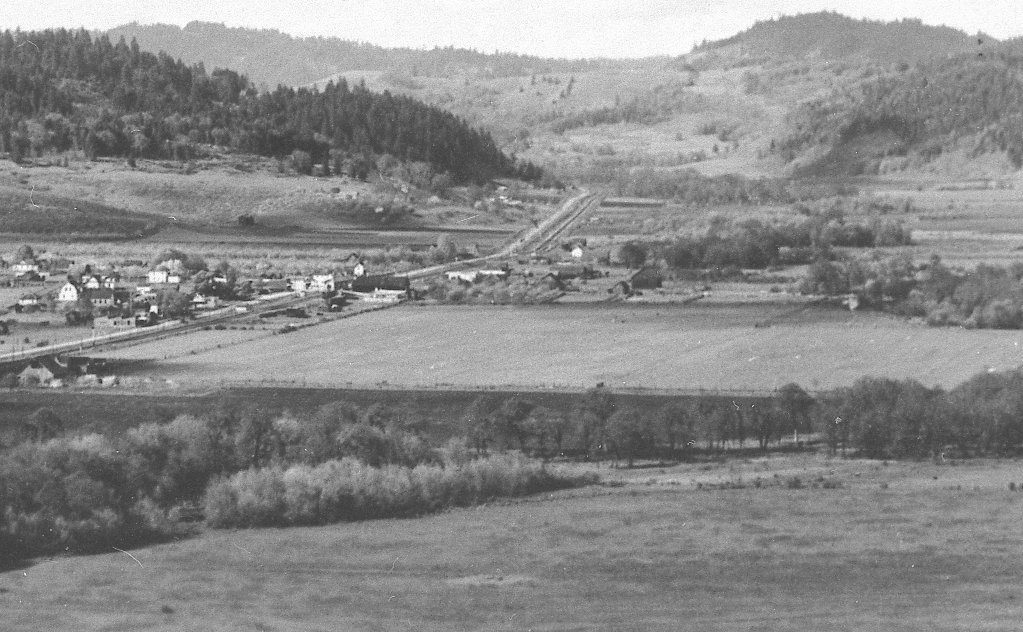
![]()
In the 1920’s this field served as an emergency landing strip. The book “Yoncalla Yesterday” published by the Yoncalla Historic Society in 2001 states “The Yoncalla emergency airfield was about 2200′ long and 1000′ wide, located easterly from the railroad loading docks and west of Poodle Creek (Yoncalla Creek). The land was owned by Bob Thompson who annually harvested a crop of highland bentgrass seed from it. The rotating field beacon was located on the west edge approximately 400′ due east from the junction of Applegate St. and the Pacific Highway (the SE corner of the City Hall lot). Stationary field lights, located about 100′ apart, delineated the exterior boundaries of the airfield at night.”
Early Logging History
The north end of the site was the first to be developed by a timber company in the mid-1930s. Francis Bigelow of the Bigelow Mill had originally started his business approximately 10 miles east of Yoncalla in Elkhead, OR. After depleting the timber supply there, he relocated his mill to the northern end of what was then the Yoncalla Emergency Airfield. A few years later in 1939, the Scheiman Brothers built a mill at the south end of the site (See figure below). This began the divided northern/southern layout of the Yoncalla mill pond site.
The year of 1941 set the stage for the first round of changes on site. The site’s proximity to the railroad proved to be beneficial to the mills. The Kruse Lumber Co. in Skelley, OR decided to take advantage of the town location and loading docks, and purchased the Scheiman Brothers mill at the south end of the site. In the same year, at the north end, Kissling Lumber Co. purchased the Bigelow Mill.
In the early 1940’s, the Exchange Sawmill Sales Company (ESSCO) of Kansas City, MO. purchased the Elmer Kruse mill at Yoncalla, OR setting up Yoncalla Lumber Company. Also, Western Timber & Land, an associated company, was formed to buy timberland.
Many of the Kruse employees transferred along with the mill and logging. J.N. Sparks, a “transplanted” southerner, was the overall superintendent. Glenn Coons was logging foreman. Some of the logging employees were: Walter Coons, Alfred. Waters, Bob Roberts, Ernest Warner, Tommy Palmer, Fred Sefton, Jack Mcnab, George Roberts, Earl McDaniels. Company bookkeeper: R.W. Cabaniss.
Known logging equipment: 3 sled donkeys, (2 yarders, 1 loader) 1 caterpillar tractor, 1 international tractor, 1 grader. Some areas logged: “Indian Timber” sale in Salt Creek, Red Hill, Kingery Ranch, and Green Ridge Creek, off of Billy Creek in Skelley. Yoncalla Lumber purchased the first Skagit BX-100 or -125 yarding donkey used in this area. It was referred to as “the big machine.”
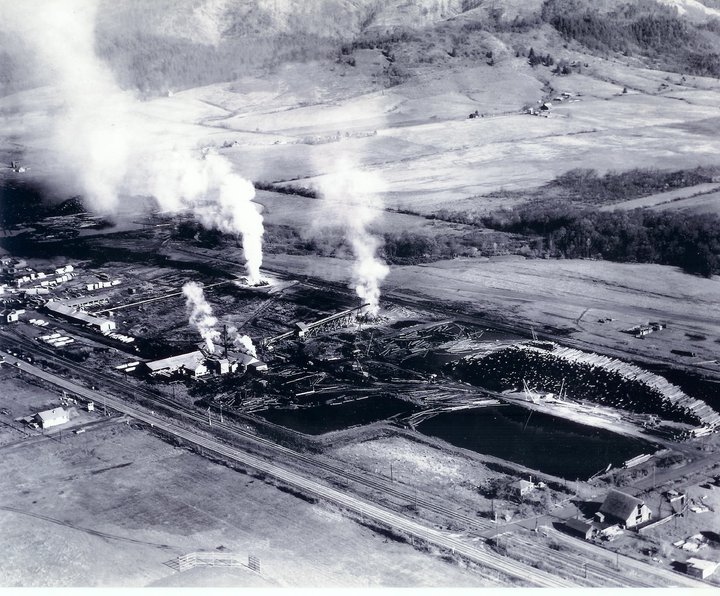
ESSCO (Kruse) Mill circa 1940’s
In 1953 the mill burned and ESSCO then purchased the Kissiling Sawmill located just to the north. The planning mill (located on the left side of the photo) did not burn and continued operation.
Yoncalla lumber ceased doing its own logging in the early 1950’s, relying on “gyppo” loggers for supply. Western Timber & Land continued as the land and timber-acquiring company. Some of the ‘gyppos’ that worked for Yoncalla were: Jenkins Logging, E.A. Wilson Logging & Sawmill, Hite Logging Co., Two Brothers Logging & Sawmill (Wayne & Herschel Phillips). Glenn Coons was promoted to logging superintendent.
The log ponds were modified in the 1950’s as shown in the water rights maps.
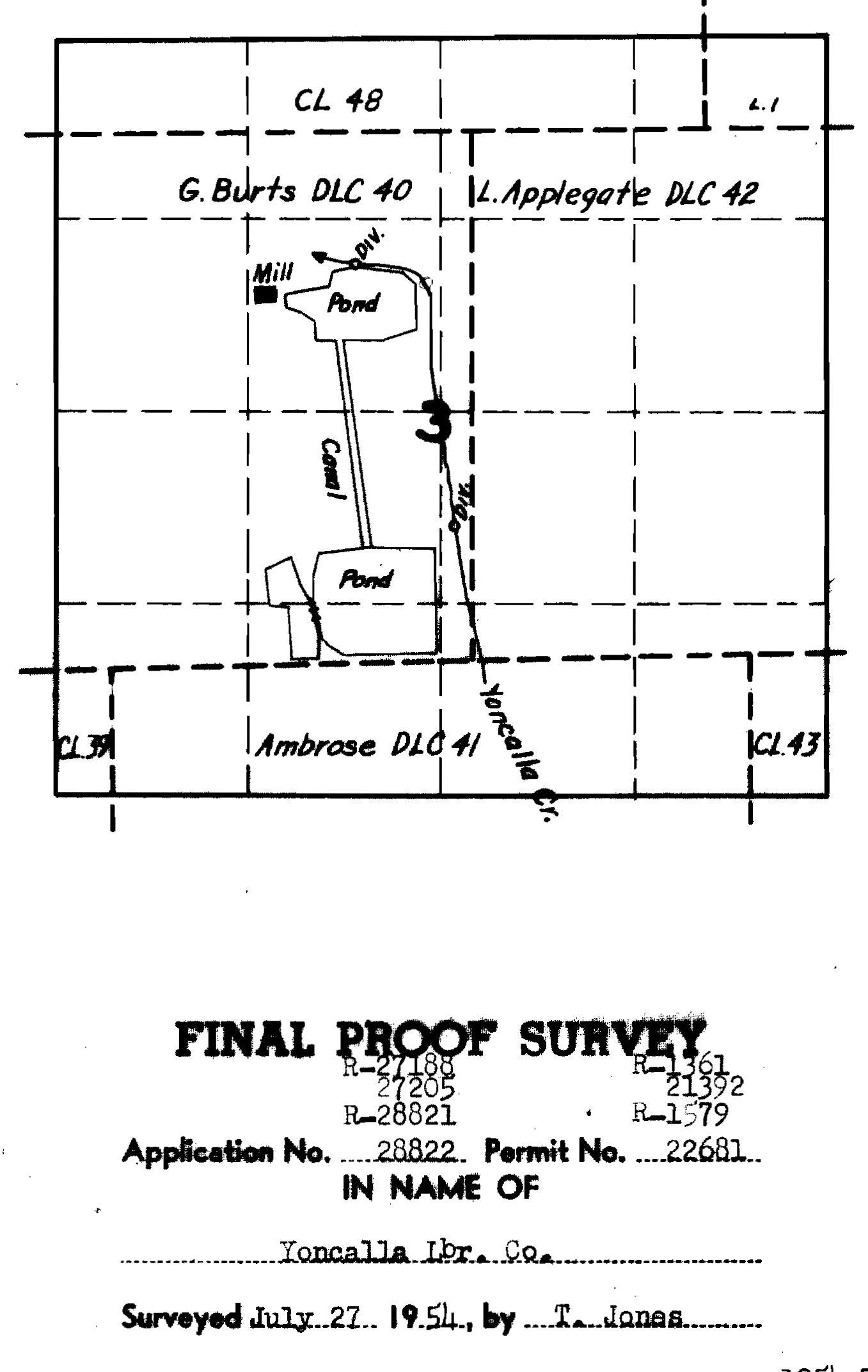
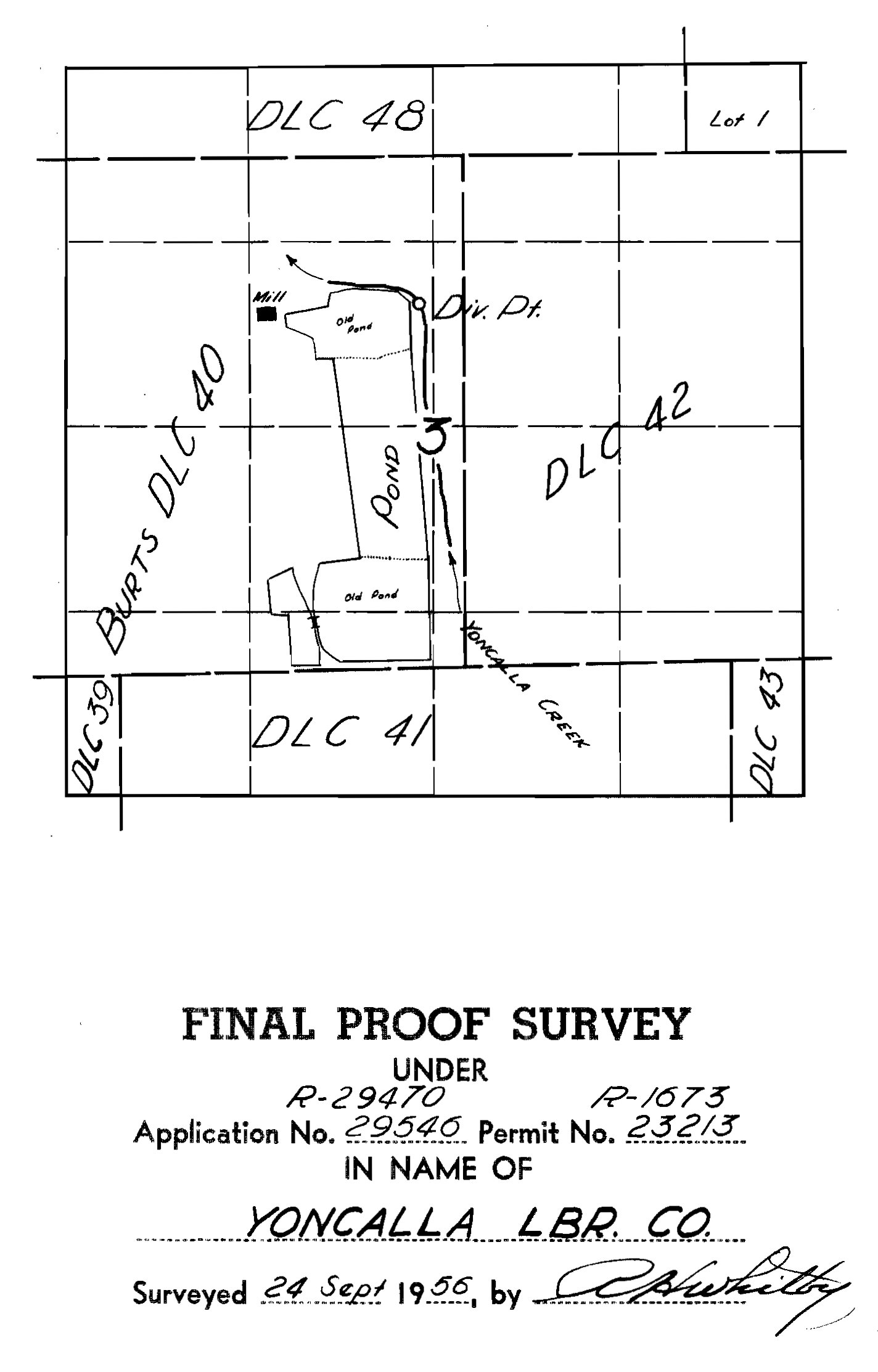
Operations continued through the 1950’s, finally shutting down in 1961 or 1962. In 1963, Yoncalla Lumber Co, and the western timber land holdings were sold to Harold Woolley (Woolley, Logging, Smith. River Lumber Co., Drain Plywood). The mill and planning mill were sold and dismantled. Woolley used the ponds for log storage into the 1970’s.
